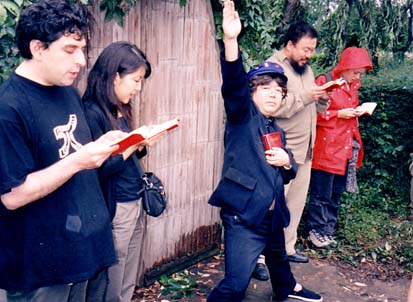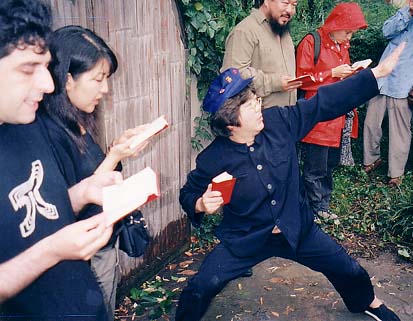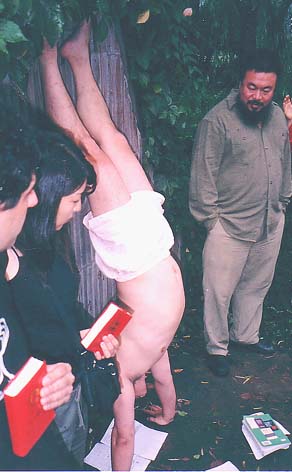in Xi'an, China Sep.2002
14 Sep. 2002
6. ARAI Shin-ichi(Japan)
"Tourist #4 Globalism/Internationalism"
At first ARAI said
In my childhood , TV news in Japan sometimes showed me that Chinese children, the red guard attacked bad adults like the head teacher and their big street demonstrations.
And also the children of farmers in Narita area in Japan fought against riot task forces with their parents. Because these days Japanese government wrested their lands from them to build up new Tokyo (Narita) airport without any agreements.
These two actions of children shocked me very much.
Especially I thought the Chinese children with "the Little Red Book (Quotations from Chairman Mao Tse-tung)" were my heroes and heroine.
Then I started to deeply read Lu Xun at the university who was the father of Chinese modern literature and also militant cultural activist before communists revolution.
Because for me and also Japanese young people, he is an amiable novelist.
I think 90% of Japanese children read Lu Xun at junior high school now and then.
Because his novels have been placed in almost all text book of junior high school in Japan.
And Mao Tse-tung also respected Lu Xun very much.

Arai choose 4 person to read the chapter "32. CULTURE AND ART"
of "the Little Red Book (Quotations from Chairman Mao Tse-tung)"
Lena ERIKSSON / German virsion
AI Weiwei / Chinese virsion
IIDA Yoko / Japanese version
Lennie LEE / English version
(from right to left)


After their reading of the chapter "32. CULTURE AND ART"
of "the Little Red Book (Quotations from Chairman Mao Tse-tung)"
ARAI did his handstand to read the last paragraph of "The True Story of Ah Q"
written by Lu Xun in his poor Chinese language, English and Japanese.
Quotations from Chairman Mao Tse-tung
32. CULTURE AND ART
In the world today all culture, all literature and art belong to definite classes and are geared to definite political lines.
There is in fact no such thing as art for art's sake, art that stands above classes, art that is detached from or independent of politics. Proletarian literature and art are part of the whole proletarian revolutionary cause; they are, as Lenin said , cogs and wheels in the whole revolutionary machine.
"Talks at the Yenan Forum on Literature and Art" (May 1942), Selected Works, Vol.III p.86.
Revolutionary culture is a powerful revolutionary weapon for the broad masses of the people. It prepares the ground ideologically before the revolution comes and is an important, indeed essential, fighting front in the general revolutionary front during the revolution.
"On New Democracy' (January 1940), Selected Works, Vol.II p.382.
All our literature and art are for the masses of the people, and in the first place for the workers, peasants and soldiers; they are created for the workers, peasants and soldiers and are for their use.
"Talks at the Yenan Forum on Literature and Art" (May 1942), Selected Works, Vol.III,p.84
Our literary and art worker must accomplish,this task and shift their stand; they must gradually move their feet over to the side of the workers, peasants and soldiers, to the side of the proletariat, through the process of going into their very midst and into the thick of practical struggles and through the process of studying Marxism and society.
Only in this way can we have a literature and art that are truly for the workers, peasants and soldiers, a truly proletarian literature and art.
lbid., p.78.
[Our purpose is] to ensure that literature and art fit well into the whole revolutionary machine as a component part, that they operate as powerful weapons for uniting and educating the people and for attacking and destroying the enemy, and that they help the people fight the enemy with one heart and one mind.
lbid., p.70
In literary and art criticism there are two criteria, the political and the artistic. . . .
There is the political criterion and there is the artistic criterion; what is the relationship between the two? Politics cannot be equated with art, nor can a general world outlook be equated with a method of artistic creation and criticism. We deny not only that there is an abstract and absolutely unchangeable political criterion, but also that there is an abstract and absolutely unchangeable artistic criterion; each class in every class society has its own political and artistic criteria. But all classes in all class societies invariably the political criterion first and the artistic criterion second. . . . What we demand is the unity of politics and art, the unity of content and form, the unity of revolutionary political content and the highest possible perfection of artistic form. Works of art which lack artistic quality have no force, however progressive they are politically. Therefore, we oppose both works of art with a wrong political viewpoint and the tendency towards the "poster and slogan style" which is correct in political viewpoint but lacking in artistic power.
On questions of literature and art we must carry on a struggle on two fronts.
lbid., pp.88-90.*
Letting a hundred flowers blossom and a hundred schools of thought contend is the policy for promoting the progress of the arts and the sciences and a flourishing socialist culture in our land. Different forms and styles in art should develop freely and different schools in science should contend freely. We think that it is harmful to the growth of art and science if administrative measures are used to impose one particular style of art or school of thought and to ban another. Questions of right and wrong in the arts and sciences should be settled through free discussion in artistic and scientific circles and through practical work in these fields they should not be settled in summary fashion.
On the Correct Handling of Contradictions Among the People
(February 27,1957), 1st pocket ed.,pp.49-50
An army without culture is a dull-witted army and a dull-witted army not defeat the enemy.
"The United Front in Cultural Work"(October 30,1944),Selected Works,Vol.III p.235
the last paragraph of "The True Story of Ah Q"
written by Lu Xun
As for any discussion of the event, no question was raised in Weizhuang village. Naturally all agreed that Ah Q had been a bad man, the proof being that he had been shot; for if he had not been bad, how could he have been shot? But the consensus of opinion in town was unfavourable. Most people were dissatisfied, because a shooting was not such a fine spectacle as a decapitation; and what a ridiculous culprit he had been too, to pass through so many streets without singing a single line from an opera. They had followed him for nothing.
December 1921
6. ARAI Shin-ichi (Japan)
"Tourist #4 Globalism/Internationalism"
Xi'an Banpo Folk Custom Village